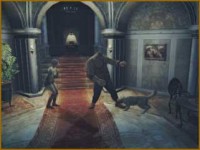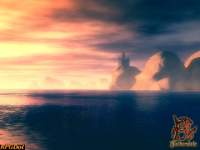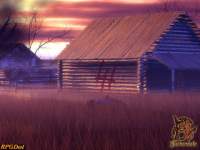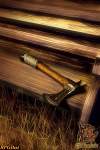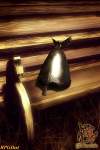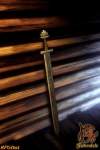|
|
|
Main News Forums Games Games Database Top 100 Release List Support Files Features Reviews Previews Interviews Editorials Diaries Misc Download Gallery Music Screenshots Videos Miscellaneous Staff Members Privacy Statement |
Fatherdale Interview, Part 1 Myrthos, 2001-04-07
About Snowball and the team Sergei: Snowball is good -- other than that, there's not much to tell :o). Seriously though, we are one of the oldest game developers in Russia and we are working together since late '96. We incorporated the studio back in '97, about the time we started working on the first prototypes for Fatherdale universe, and we launched our own publishing arm a year after that, in late '98. Financially, the team itself owns the company and the localisation and publishing side of the studio is our major source of revenue, all of which we spend on the development -- and it's also the source of very interesting experience of seeing the games business from the other side of the table. For us, bringing other games to Russia is like becoming a stepfather to each of them, and we take it very creatively. We discovered that if you care, if you really stand behind the product, then the sky is the limit -- and we expect the same attitude from Fatherdale's international publishers. You know how there are publishers and publishers -- sales culture versus games culture. In the end, games culture always wins.
In the beginning, there was a time when we were desperate to find a publisher as soon as possible and agree to compromises like "let's ship the first as a B-title and then improve with the sequel", but we were lucky in that instead we've set up a very efficient publishing operation here and shifted the financial pressure. Among others I'd like to thank Gary Kussman of Monolith and Susanne Kiel of TopWare and Bjorn Larsson of Iridon for helping us along when we were just starting, their support and the support of other friends in the industry helped us to dare to take the independent road. Now, after all these years of research, we have such a great amount of good content on both research and design that we're certain the game will be a jewel -- it's just a matter of how much time it takes to polish it and make it balanced. Oh yeah, and throughout these five years not a single person has left the team -- I think it tells something about the spirit, doesn't it? :-)
About Gameplay RPGDot: Could you tell us something of the background story of Fatherdale. Sergei: The main thing to understand is how two concepts come together: immortal heroes and authentic medieval environment.
And so they make up several unions, each with its own goals -- and the quests that these unions try to achieve, unfold across the history of mankind, from the early medieval times to the era of space colonisation. When Columbus sailed to America, he already had several heroes on board -- looking for a way to use the discovery to the good of their own union. When the first rebel space ship stopped communication with Luna-2 and broke away from the fleet to run away and establish its own hidden space oasis, the mutiny was also lead by one of such heroes. There are not so many of them, but they influence the history. They start wars, they sail to new lands... They create and they destroy, they are the true moving force of the new world. As the first game from the series, Guardians of Asgard is a tale of one of such quests which happens in AD 1072, at the time when three major cultures crossed their paths near River Don, in the valley that has been known as Fatherdale even before people have settled there. There are Viking Warriors, Nomad Riders and Slav Guardians, and behind them are the heroes using the time of trouble and unrest to fight for their own goals. The barbarian tribes are simple but strong, in a situation like this one man -- even though he would be an immortal hero with vast knowledge of past battles -- wouldn't mean a thing unless he can raise an army of his own. And so they raise. And plot. And burn.
For many lives Reinar served as a mercenary as he likes to travel. He is also sceptical about rhetoric's and would rather trust his sword than his advisors -- he doesn't believe in Good and Evil, but he believes in reason, honour and valour. He doesn't trust any allies, but he relies on his friends -- and unlike other heroes from his union, he really loves the new world and is an integral part of it. He's here, he loves, he feels, he's not afraid to get too close to these mortals, and where other heroes see dirty uneducated barbarians, he sees brave and loyal brothers in arms. The whole story starts when Reinar receives a call of help from his friend and prince of Fatherdale: the warlord of the valley is killed, a military advisor mysteriously disappears and the Nomads seem too agitated to write that off as a usual turbulence. Moreover, all kinds of vermin fill the roads to the valley and simple folk talks about nothing but bad omens -- and so Reinar sets to travel to Fatherdale and assumes the position of warlord until the trouble passes away. But only once he's there, he starts to understand the scope of the approaching evil and the shadows that stand behind these seemingly accidental problems and conflicts...
We have one of the directors of the National Historical Museum as our chief consultant, and we have done a lot of research to create a game which players could trust -- there are no "magically enchanted dragon swords", but there are narrow battle axes to break through chain mails, wide Viking axes that slash leather armour and so on. The best thing for me is that the RPG stats flow naturally out of the appearance because everything is based on reason, logic -- just a few hours into the game you start to understand the value of new weapons just by the look of it, and there's *a lot* of beauty in the designs of real weapons. Just check out the pictures in our inventory. But of course you can't base the relationships or dialogues on the research as we can only access the material evidences, and so we did our part of reading though sagas and tales and social research of the tribes and nations of that time.
And then the Slav Guardians -- people who have chosen war as their ultimate profession, people who made it a tradition, who set the standards to follow. All these rules of fight, all these charismatic leaders... When you first read about a certain prince who was ambushed and killed and then his enemies made a cup out of his skull to drink mead from it, it sounds strange and barbarian. But when you know what it meant for them, when you get into the atmosphere, then you can really appreciate the honour they have given by this gesture.
|
|||||||||
|
All original content of this site is copyrighted by RPGWatch. Copying or reproducing of any part of this site is strictly prohibited. Taking anything from this site without authorisation will be considered stealing and we'll be forced to visit you and jump on your legs until you give it back. |
||




